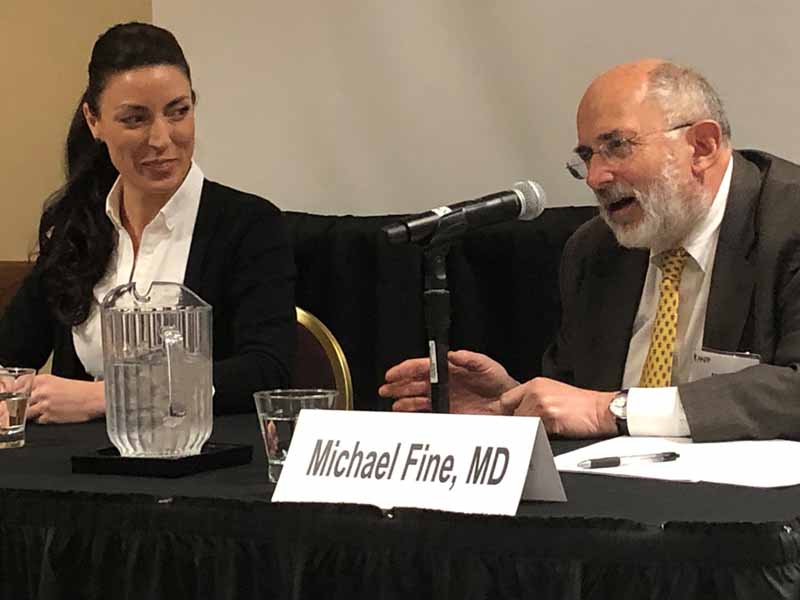ACLF Speakers Urge FPs to Advocate for Health System Reform
Moderator Touts New AAFP Health Care Reform Primer
May 06, 2019, 03:25 pm David Mitchell Kansas City, Mo. – With another election year looming, it's unlikely that physicians and patients will see politicians take bold action on health care policy before voters cast their ballots in 2020, panelists said April 26 during a session at the AAFP's Annual Chapter Leader Forum here.
"Nothing is going to change much at the federal level, and certainly nothing is going to change anytime soon," said family physician Michael Fine, M.D., senior population health and clinical services officer for Blackstone Valley Community Health Care, which operates six medical offices and a dental clinic in Pawtucket and Central Falls, R.I.
However, said Fine, a former director of the Rhode Island Department of Health, gridlock at the federal level -- and the mounting frustration associated with it -- could create opportunities to effect change at the state level.
The key, he said, is for more physicians to get involved in advocacy.
"It's time to stop admiring the problem," he said, noting that the United States is expected to drop to 64th in the world in terms of life expectancy by 2040. "There's no reason to think it's going to get better just because we want it to. We are the outlier in the world. Less than one-third of our physician community is in primary care. When it comes to primary care spend, we just aren't getting there."
Fine said things might actually change if physicians talked to patients about health care costs and helped them understand the need for change.

Family physician Michael Fine, M.D., of Pawtucket, R.I., speaks during a session about health system reform at the 2019 Annual Chapter Leader Forum in Kansas City, Mo. Washington, D.C.-based health and human rights consultant Nicole Fisher, M.P.P., also participated in the April 26 panel discussion.
"The average cost of care in this country is $11,000 per person per year," he said, "and about half that care is unnecessary. That means there is about $5,000 per person per year coming out of everyone's pocket and going to profit instead of meaningful care.
That's money, he said, that could be supporting factors that ultimately affect people's health, such as housing, public transit and education.
Costs are becoming a challenge for more and more Americans, said moderator Purva Rawal, Ph.D., a principal at the health policy consulting firm CapView Strategies in Washington, D.C., and adjunct assistant professor at Georgetown University.
STORY HIGHLIGHTS
"Affordability used to mean cost for the uninsured and underinsured or the cost to government," she said. "Now it's a kitchen table issue where middle-income and even upper-income families are feeling it. Affordability is driving debate."
After years of decline, the number of uninsured Americans is beginning to tick upward, she said.
Panelist Nicole Fisher, M.P.P., founder and president of Health and Human Rights Strategies, also based in Washington, said patients (and voters) also need to be educated about the financial challenges that primary care physicians face.
"The public has this perception that all docs make a million bucks and live in gated communities," she said. "They don't have any idea how much primary care doctors make or how much student debt there is. They don't understand what you do every day."
That knowledge gap, she said, makes it difficult to get traction on efforts related to increased payment for primary care.
During the wide-ranging session, Fine said primary care clinics need to "meet people where they are," which means offering greater access during nights and weekends to compete with retail health clinics and urgent care centers and keep patients out of ERs.
Improving access, Fine said, would call for "radically increasing the number of people we're training."
Fisher pointed out that one-fourth of U.S. primary care physicians are foreign-born, and that in addition to increasing the numbers of residency positions offered, the United States should make it easier for international medical graduates to come here to complete their training and practice.
"This is an interesting climate to say that in," she said.
Fine and Fisher both offered examples from around the world to show the power of physician advocacy and primary care. For example, when the government of Madrid, Spain, planned to privatize six hospitals and 27 primary care centers, health care professionals responded with protests, a strike and lawsuits. The privatization effort eventually stalled.
Spain, Fine pointed out, has one of the best health care systems in the world, and it's primary care-based.
Rawal encouraged attendees to read the AAFP health care reform primer "Health Care for All: Moving to a Primary Care-Based Health System," which was released during the leadership conference. The primer evolved out of a comprehensive analysis of international models of health care coverage and financing systems that was included in a Board report to the Congress of Delegates and another Board report issued last year that addressed opportunities and challenges outlined in the 2017 report.
The COD subsequently adopted a substitute resolution that called on the AAFP to make both Board reports available to increase awareness and understanding among family physicians about potential health care reform options. In response, the AAFP commissioned the production of a document that would serve as a primer on the two Board reports and provide a summary of the AAFP's approach to future health care reform efforts.
Fine is scheduled to speak again about health system reform during FUTURE (formerly National Conference of Family Medicine Residents and Medical Students), July 25-27 in Kansas City, Mo., and all three panelists will discuss the topic again again during the Family Medicine Experience Sept. 24-28 in Philadelphia.